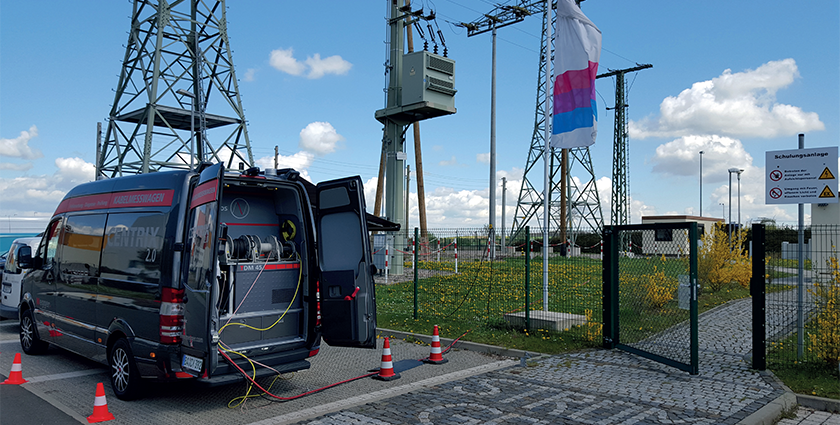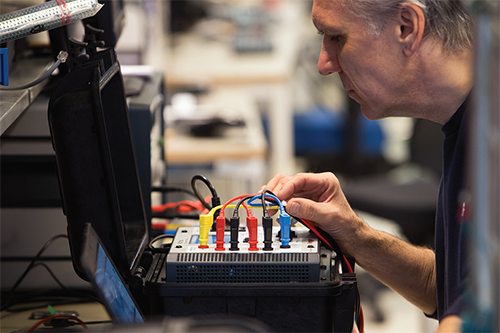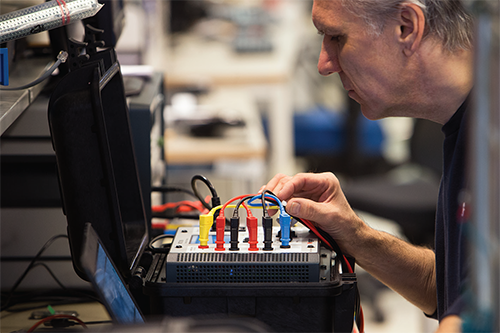
Megger Ltd
Investing in accuracy
A giant of electrical testing equipment provision, Megger is building on its rich legacy with recent ventures into smart monitoring solutions, and an ongoing international expansion
The history of Megger stretches back more than a century. Founded by Sydney Evershed, the so-called ‘Father of Insulation Tester Equipment’, in 1903, the company’s first product – the AVO Meter, the world’s first multi-meter tester – arrived two decades later. Since then, Megger’s story has been one of acquisition. The company has made a number of successful business purchases across the US, Germany, Sweden, and elsewhere, providing a platform for rapid organic growth.
Today, Megger’s forte still lies with electrical test equipment. But as Piers Grumett, Group Operations Director at Megger, points out, this is by no means a narrow field of expertise. “We produce equipment ranging from small, handheld devices that an electrician will use to conduct wiring tests in your house, all the way up to van-mounted equipment used by utilities to test substations,” he says. The company offers services including scheduled maintenance, fault-finding, and much more besides. “We also do test equipment for electric motors or rotating machines, be that an electrical generator, or an instrument on a factory floor.”
Megger prides itself on its exceptional standards of safety – a point on which, according to Piers, the company goes “over and above”. This, coupled with the fact that Megger produces some of the most accurate products available on the market, is testament to the company’s rigorous investment in research and development. “Our customers are looking for functionality,” Piers explains. “Every year, we add functionality to various product lines, we accelerate our testing to make them more efficient for our customers, and we work to make our products more robust.”
This incremental process forms the bulk of Megger’s product development work, but the company is no stranger to innovation, and has recently sought to explore new opportunities within smart and online monitoring. “Previously, we’d focus on periodic testing, in which a technician or engineer would visit a client’s asset on a monthly or annual basis to ensure that it continued to run healthily,” Piers indicates. “More and more, online monitoring is an alternative that we’re exploring, in which a customer will purchase a unit that they can affix to their asset, such as a transformer or motor, which we can then monitor in a remote capacity.
“If a customer is only doing periodic testing once a year or less, a lot can happen in that time frame,” Piers adds. “It might be that an asset needs some attention or care sooner than expected, or alternatively, it might reveal that an asset is in much better condition than we expected, and its replacement can be postponed. In either case, by conducting continual, real-time assessments, we can identify trends over a period of time, extrapolate performance, and ultimately prolong the lifespan of a piece of equipment.”
As part of this strategy, it was announced in December of 2021 that Megger had acquired Metrycom, a leader in Smart Grid monitoring solutions. Since rebranded as Megger Grid Analytics, the company provides grid network sensors and analytics using best-in-class sensor technology, enabling power utilities to get better visibility into MV networks, assist in grid operation management, and perform preventative condition-based maintenance.
For utilities, this heightened insight into energy flow is critical at a time when more and more decentralized generation systems are being added to the grid. “Today, we have wind farms, solar farms, and individual panels installed at people’s houses,” Piers notes. “We’ve come a long way from the old reality of big central power systems that pushed energy exclusively in a single direction.
“Add to that the increasing number of people charging their electric cars, and we can see that patterns of energy flows are changing substantially,” he goes on. “This system helps the grid owner to understand those changes and flows as they are happening. It provides them with the information they need to manage their grid carefully, to ensure there’s enough power, and to maintain the voltage as people come online and offline. It makes a complex process more efficient.”
Amid its ongoing quest for expansion, Megger benefits from its strong links and excellent brand name, in what is a relatively conservative industry. Nonetheless, the drive behind its strategy isn’t all about performance. As Piers emphasizes, Megger views itself as a value-oriented company, and asks the same of those with whom it seeks to partner.
 “We have a set of five core values: caring, creative, consistent, captivating, and confident,” Piers reveals. “Upon acquisition, we look for companies that fit within that comfortably, and it’s incredibly important to us that we find a match. At the same time, we remain focused on delivering customer value.”
“We have a set of five core values: caring, creative, consistent, captivating, and confident,” Piers reveals. “Upon acquisition, we look for companies that fit within that comfortably, and it’s incredibly important to us that we find a match. At the same time, we remain focused on delivering customer value.”
Citing the need for these values to be “center-led”, Piers speaks positively about Megger’s efforts thus far to instill this culture throughout its employee base. “We have great people,” he admits. “Supply chains are a particularly great example, given all the obstacles that businesses are facing today. Yet, our teams have stepped up. They’ve spent long hours calling round to our suppliers, working in collaboration to try and replace components that we can’t source with those we can, and to engineer novel and expedient solutions.”
To that end, Megger introduced its excellence system in 2019 – a continuous improvement system based on the principles of Lean manufacturing and operational excellence. “We adopt a problem-solving approach,” Piers remarks. “Bad stuff happens. How you react to what happens is the important part. You can sit there and stew, or you can get on with the solution. All successful companies will opt for the latter. It’s a mindset that makes us stronger for the future.”
In 2020, bad stuff did indeed happen, as the arrival of Covid-19 sent shockwaves across the globe, and throughout every industry. Predictably, Megger didn’t panic. Instead, the company prioritized the need to protect its people – implementing the necessary control measures, and allowing people to work from home, as it sought to minimize risk. Megger also took steps to retain its staff, despite sector-wide fears of unemployment.
“A second priority was to support our customers,” Piers suggests. “We were very clear that if our customers needed help, we’d be there to answer any of their questions. People still needed to keep electricity supplied throughout the pandemic, and many needed help, so we did a lot of training webinars to help beef up our customers’ skills and capabilities.
“We also had to preserve our cash,” he goes on. “We did reduce our investments for a short period, until we were more confident of how the situation was going to develop. Thankfully, I’m not aware that we had any transmission of Covid-19 in the workplace, despite the fact that all our factories remained open. That in itself is a testament to our efforts.”
As the turbulence of the pandemic recedes, Megger is optimistic about the years to come. As it continues its acquisition strategy, the company has also been moving the dial on an international expansion, evidenced in its recent opening of a new sales office in South Africa. “We have very good penetration in the Europe and the US, but Africa is an area we have identified for growth,” Piers tells us. “South Africa is our first location, but we’d like to follow it up with another in the West or the North of the continent. Last week, we participated in a double summit, sending two teams of experts and sales teams to Tanzania and Senegal to run sessions with potential customers. We had almost 200 customers attend, in what was a clear demonstration of Africa’s importance within our global strategy.”
True to its history of innovation, Megger is even eyeing up new ventures, with a particular focus on the growing importance of electricity. “There’s a lot going on in terms of the decarbonization of our energy supply,” Piers concludes. “We believe that electricity is a key component of that. Whether it’s transportation, such as electric cars, or home heating, with heat pumps, it’s a sector that’s going to see big demand. We view it as an opportunity. Between that, and our investment in monitoring and software, our target is to pretty much double the size of the business in the next five years.”
Megger Ltd
https://megger.com
Services: Electrical testing equipment and software